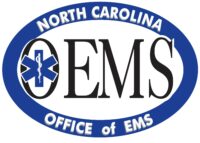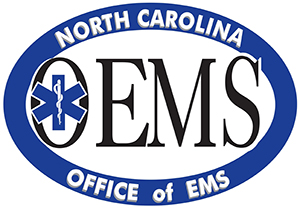The Emergency Medical Services for Children (EMSC) Program works to decrease child morbidity and mortality due to severe illness or injury. It does this by working to improve the emergency medical care system as it pertains to children’s needs across the continuum of emergency care – including prevention, pre-hospital care, acute care, rehabilitation, and reintegration into the community. The EMSC Program is funded by the U. S. Department of Health and Human Services, Health Resources and Services Administration, Maternal and Child Health Bureau in collaboration with the National Highway Traffic and Safety Administration.
This web page provides an overview of current EMSC initiatives and policy directions and provides resources for a variety of stakeholders working to address the needs of children at risk for or who need emergency medical care in the state of North Carolina.
EMSC DAY RAFFLE
The EMSC Survey was completed on March 31, 2022, with 135 agencies graciously responding to the thirty (30) question survey that helps determine the landscape of pediatric preparedness, priority in training, use of equipment, and presence of a Pediatric Emergency Care Coordinator, etc. This year the EMSC program is showing appreciation to the respondents of the survey with a training equipment raffle. Nine agencies have won adult and pediatric MCI training manikins purchased from Boundtree Medical Supplies. Congratulations to our winners!
Here are the winners:
- Bladen County Emergency Medical Service
- Currituck County Fire-EMS
- Hoke County EMS of Cape Fear Valley Health
- Mission Hospitals Madison
- Rutherford County Emergency Service
- Yadkin County EMS
- Cabarrus County EMS
- Fair Grove Fire Department
- Wilson County Department of EMS
North Carolina Survey Reports
- 2023 EMSC Survey
- 2022 EMSC Survey
- 2021 EMSC Survey
- 2020 EMSC Survey
- 2021 NPRP NC
- 2021 NPRP National (data not available)
- 2013 NPRP NC
- 2013 NPRP National
Continuing education opportunities
An interactive online autism awareness course is available. This course has been developed by Prevent-Educate.org in cooperation with the Autism Society of America. It is a multi-media presentation that features a live instructor and incorporates state-of-the-art digital graphics and video. EMS personnel will learn what autism is and how to effectively communicate and interact with an autistic individual in any situation. The course will teach how to recognize autistic traits and characteristics, and how to reduce or eliminate dangerous behaviors that could lead to either the responder or the autistic individual being harmed, and also save valuable time on-scene. All first responders, EMS personnel, and firefighters will benefit from additional topics like search and rescue, proper restraining, challenges in the field, and seizures.
One in 100 children is born with autism and is seven times more likely to have interaction with a first responder. If you have not already met someone with autism, you soon will. The pre-test and course are available online. Please note: there is a $10 fee to take the course.
The course has national Continuing Education Coordinating Board for Emergency Medical Services accreditation for five hours of continuing education hours in basic life support, advanced life support, and first responders. For the approval of continuing education hours, please contact your system medical director.
Here to Help: Proper Child Restraints in Emergency Vehicles
This is an OEMS online training video for EMS professionals that provides one hour of continuing education credit. The training is housed in NC TERMS. Follow the link to the login screen. After logging in, click:
- “Online Training”
- “Here to Help: Proper Child Restraints in Emergency Vehicles”.
Click here, OEMS online training video, to view only the video portion of this training
What you will learn: In this engaging and informative training video, designed for EMS personnel, including administrators and training officers, you’ll hear from experts why it’s important to appropriately restrain, and safeguard children in ambulances. You’ll learn about pediatric restraint devices and see a demonstration of how to use the equipment to properly restrain and transport children. You’ll also get some tips on safe pediatric transport.
This training video is one hour in length and includes a quiz, which will be activated after viewing the course. A passing grade of 70% or more will allow you to print a certificate of completion and earn one hour of continuing education credit.
View the printable version of the course: Here to Help: Proper Child Restraints in Emergency Vehicles
Important: Please be aware that you may encounter pauses in the streaming video when viewing it on a computer. This is due to the computer speed and not the video itself.
Group viewing: If the training video is being viewed simultaneously by a group via a computer, and each person in the class needs to login to NC TERMS to take the quiz and receive a certificate of completion per agency or system continuing education unit (CEU) policies, the training officer must contact the central OEMS office to receive an electronic copy of the quiz, the answer key, roster form, and certificate of completion template. Training officers will then have to administer hard copies of the quiz, grade them, provide the roster to their regional specialist, and provide CEU documentation to the students who have taken and passed the quiz per your agency or system’s policy.
For information contact DHSR.EMSC@dhhs.nc.gov.
EMSC Advisory Council
The EMSC Advisory Committee is a voluntary committee that consists of individuals representing pediatric prehospital care, acute pediatric emergency care, prehospital education and administration, school health, maternal and child health, and families. It is convened quarterly to provide the Office of EMS and the EMSC State Partnership program with guidance and input on statewide activities, priorities, and policies aimed at improving the emergency medical care that children receive throughout the state.
The current chair of the EMSC Advisory Committee is Michael Mitchell, MD, pediatric emergency physician at Wake Forest University Baptist Medical Center.
EMS REsources
- Pediatric Transport Products for Ground Ambulances
- Pediatric Continuing Education in North Carolina: Results from a 2010 Statewide Survey
- N.C. Guidelines for Safe Pediatric Transports provide guidance for restraining pediatric patients, and children who are not patients, when being transported in an ambulance.
- National Highway Traffic Safety Administration’s Do’s and Don’ts of Transporting Children in an Ambulance provides general safety measures to take when transporting children.
- Study Packet for the Correct Use of the Broselow™ Pediatric Emergency Tape
- N.C. Recommended EMS Guidelines for Children and Youth with Special Health Care Needs have been added to the “Other References” section of the 2009 N.C. EMS Treatment Protocols. These provide step-by-step guidance on how to manage medical emergencies involving various types of medical technology that may be encountered when called to care for a special needs child.
Hopsital Resources
- Transfer of the Pediatric Patient, Recommendations of the North Carolina EMSC Advisory Committee, Office of Emergency Medical Services provides guidance to hospitals on when to consider transferring a pediatric patient who is critically ill or injured, what to consider to accomplish the inter-facility transfer, and includes useful references.

